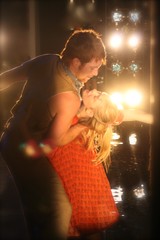
When the going gets tough, the "WONDERstudies" go on...!
An
Understudy is a theatrical term for someone who learns the lines and blocking/choreography of a leading actor or actress in a theatrical play. Should the lead actor or actress be unable to appear on stage because of illness, accident, or previously scheduled holiday, the understudy takes over the role. Being a theatrical understudy is in no way technically or emotionally easy because there is a tremendous amount of work involved for very little, if any, payoff. However, it can also be an educational and truly rewarding experience.
These are the people who must learn more than one part. Their own, and one is not several others (when one understudies a main character you often have a smaller role in the same production.) In professional theater, it is not unusual for one or two actors to understudy all the lead roles (such as in
Fiddler on the Roof), in which case you learn numerous parts.
Here is some insight into the world of the next in line...

When an understudy is performing a leading role, the theater is required to let the audience know. There are three options and the theatre must elect
two of these three options depending on their preference. 1. The Stage or Company Manager will make the announcement prior to the start of the performance, 2. There will be printed inserts in the theatre programs, or 3. There are multiple printed signs all over the foyer indicating who is performing the roles that evening. Some theatres elect to have a large board outside the main entrance, with removable names on so the theatre can present a cast list for THAT specific performance (see above photograph-- as you can see from this performance board from The Woman in White, at that evening's performance, the role of Marion Halcombe was not played by Ruthie Henshall, but played by the Understudy Yvette Robinson as indicated.) If a leading actor goes off in the middle of a performance, there
must be an announcement made at some point during the performance, detailing where the leading actor stopped playing the role, and the understudy continued.

In musical theatre, the term
Swing is often used to refer to a member of the company who understudies several ensemble and/or dancing roles, (and sometimes covers leading smaller leading roles as well). A
Super Swing is a Swing who may commute around the country as needed to act in various productions of a widespread show (
Chicago, Mamma Mia!, Wicked, etc.). An alternative term traditionally used is
Cover.
A
First Cover is a name for the performer who is the first person called to go on in the event of the leading actor going off. A
Second Cover is a name for the performer who is next in line, thus, the second person called if both the leading and First Cover actor are indisposed. In some high energy or dance-oriented companies (for instance,
Mamma Mia! is often one),
Third Covers are utilized. Most of the time, First and Second Covers are in the Ensemble or are Swings.

A
Walking Cover is a name for a performer who does not appear on stage during a typical evening's performance but waits backstage ready to go on for a specific role. They are often utilized for particularly demanding roles such as Eva Peron, The Phantom, Elphaba, etc., in addition to First and Second Covers.
An
Alternate is a performer who performs a role, a set number of performances every week. Alternates are also often utilized for demanding roles (like those above); the difference is 1. an Alternate often but not always performs daily in the Ensemble of the show and 2. the audience and ticket buyers know ahead of time that a specific performing Alternate performs every Monday evening and Thursday matinee, for example.
It is a common occurrence for Understudies of any description to never get a chance to perform the role or roles they cover. And for this and many other reasons, Understudies are the unsung heroes of the theatre because they keep the show-up-and-running and for very little glory.

If you want to break into the world of professional theatre, here are some tips (collected from the "wonderstudies" themselves):
1.
Being an understudy will always help you hone your craft, even if you
never get to perform the role you are understudying. Understand that although you may never have your moment in the spotlight, you have the opportunity to chalk up the experience to personal and artistic development.
2.
Be prepared. Pay close attention during rehearsals and study your role as if you are going to perform (and possibly without adequate rehearsal!) The most successful Understudies watch the show from the wings a few times a week and are very prepared for their Understudy rehearsals. Continue to brush up on the lines and blocking notes throughout the run of the show because you never know when you may be called in to replace the lead actor at a moment's notice.

3.
Resist any form of jealousy and gossip. It is easy to resent the actor who gets to perform the role that you have studied with equal thoroughness. However, this will only cause stress and make your experience less pleasurable and is, incidentally, considered to be unprofessional behavior. Further, it is not only professional, but truly
elegant to perform the leading role one evening, and step back into your own track with grace and dignity the next. That is, after all, the job you agreed to do.
4.
Stay positive. In the world of professional theater, being an understudy is frequently the first step to a long and thriving career. You get to work closely with well-known and talented actors and directors, from whom you can learn and make networking connections!
Here are some images of our
Carousel understudies. They are excellent!






 In musical theatre, the term Swing is often used to refer to a member of the company who understudies several ensemble and/or dancing roles, (and sometimes covers leading smaller leading roles as well). A Super Swing is a Swing who may commute around the country as needed to act in various productions of a widespread show (Chicago, Mamma Mia!, Wicked, etc.). An alternative term traditionally used is Cover.
In musical theatre, the term Swing is often used to refer to a member of the company who understudies several ensemble and/or dancing roles, (and sometimes covers leading smaller leading roles as well). A Super Swing is a Swing who may commute around the country as needed to act in various productions of a widespread show (Chicago, Mamma Mia!, Wicked, etc.). An alternative term traditionally used is Cover.







